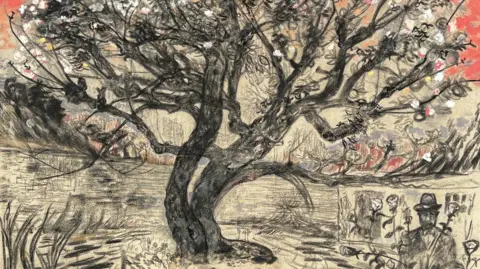Fundraising effort for original Bramley apple tree
 PA Media
PA MediaA campaign has been launched to raise funds for the original Bramley apple tree, which was planted more than 200 years ago.
The tree was sown by Mary Ann Brailsford in the garden of her parents' home in Church Street, Southwell, Nottinghamshire, between 1809 and 1815.
Almost 50 years later, 17-year-old Henry Merryweather came across a gardener carrying some of the apples, and he was allowed to take cuttings of the "Bramley Seedling", which went on to become one of Britain's most popular cooking apples.
However, the original tree has been affected by honey fungus, which current owner Nottingham Trent University (NTU) said would eventually lead it to perish.
Bramley apples are one of the UK's most popular varieties, with more than 300 growers in England and about 83,000 tonnes grown annually.
The original Bramley tree was one of the 50 Great British Trees in the Queen's Golden Jubilee in 2002, and was recognised for the Platinum Jubilee in 2022.
Artist Dan Llywelyn Hall has unveiled new works called Swansong Of The Mother Bramley, which can be viewed in the Southwell Minster, with prints available as part of the fundraising effort.
Donations raised by the campaign will go towards a tree survey and work to remove vegetation and the honey fungus.
Celia Stevens, the granddaughter of Henry Merryweather, called for improved public access and awareness of the tree, which is currently in a private garden.
"It is so disappointing that with its two prestigious awards that the surrounding garden in no way reflects what the Bramley has done for this country both locally and nationally, and that includes food during the Second World War," she said.
NTU said issues about the tree's care had not previously been raised, adding it had not been consulted about the fundraising campaign.
It said the tree was affected by honey fungus before it became its custodian, and had "already outlived its natural lifespan by quite some time".
"We are incredibly proud to be custodian of the original Bramley apple tree and recognise its significance to the local and wider community," it said.
"The tree still bears fruit and the university continues to work hard to look after it to try to prolong its life and maintain it in the most appropriate way for a tree of this age and condition."
Follow BBC Nottingham on Facebook, on X, or on Instagram. Send your story ideas to [email protected] or via WhatsApp on 0808 100 2210.
